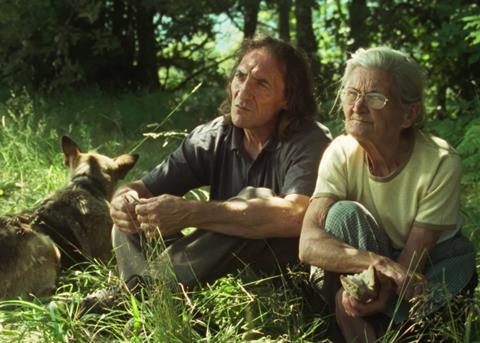Oliver Laxe’s prize-winning feature continues is strikingly beautiful and meditative

Dir. Oliver Laxe. Spain, France, Luxembourg. 2019. 85 mins
Landscape is more than a backdrop in the films of Oliver Laxe. In his follow up to the widely-admired Mimosas, the director uses the Galician countryside as a weight which rests on the shoulders of the characters, an embattled and dispersed community eking out an existence on the grey green hills of northern Spain. Returning to the community is Amador, an arsonist just released from prison after serving time for setting “the whole mountain on fire”. He quietly eases back into the routine of life, tending cows alongside his tiny, wiry mother. Then another fire consumes the land. And the benign tolerance which had greeted Amador’s return hardens.
No less powerful for the fact that there are questions in the ashes
Strikingly beautiful, meditative, elusive and measured in its pacing, this is a picture which is custom-made for the tastes of sophisticated festival and online streaming audiences (it won the Jury prize of Cannes Un Certain Regard in 2019). Landscape is central. And images of the destruction of that landscape are key. Laxe uses them as striking punctuation points in the low-key, naturalistic storytelling.
The film opens with shots of trees collapsing like matchsticks in a darkness which is as thick as smoke. It’s an unearthly scene, lit by the glare of monstrous eyes which, it becomes clear, are the headlights of a bulldozer clearing a fire break. Laxe uses Vivaldi’s ’Cum Dederit’ to accompany the scene, which, while not the most original music choice, does give the shots of natural catastrophe a savage majesty.
The return of granite-faced Amador (Amador Arias) comes during a winter that seems to have been stripped bare of colour by the lashing perpetual rain. Amador endures it, with the same hunched fortitude with which he shoulders the shame of his incarceration. His mother Benedicta (Benedicta Sanchez) says little, but there is an ancient wisdom ingrained in the few words she chooses to share with her son. When, come spring, he grumbles about the eucalyptus trees (“A plague, worse than the devil.”), she replies. “If they hurt others, that’s because they hurt too.” It’s her way of telling him that she understands, forgives.
For a while it seems as though Amador can adapt back into life; or perhaps more accurately, life can adapt around him. “He’s a good guy. It’s been hard for him.” says a neighbour who is optimistically converting a barn to house tourists. A new vet, a woman, seems interested enough in Amador for him to invent an alternative narrative to explain his absence for the past two years. A scene in which he pulls on his best shoes before heading into the town where he may just see her is heavy with muted sadness.
Laxe leaves a question mark over whether Amador set the first fire or the later one which tears through the land as he drives home to his hamlet. But there is no doubt about the destructive force of the conflagration. The footage of the futile battle to quell the flames is thrilling and terrifying; the land is left raw. Like the taciturn Amador, this outsider parable retains an element of mystery until the end. But it’s no less powerful for the fact that there are questions in the ashes.
Production companies: Miramemira, 4 A 4 Productions, Kowalski Films, Tarantula
International sales: Pyramide Films, amauruc@pyramidefilms.com
Producers: Andrea Vázquez, Xavi Font, Andrea Queralt, Mani Mortazavi
Screenplay: Oliver Laxe, Santiago Fillol
Cinematography: Mauro Herce
Editor: Cristóbal Fernandez
Production design: Curru Garabal
Music: Xavi Font
Main cast: Amador Arias, Benedicta Sanchez, Inazio Abrao, Elena Fernandez, David de Poso, Alvaro de Bazal

























No comments yet